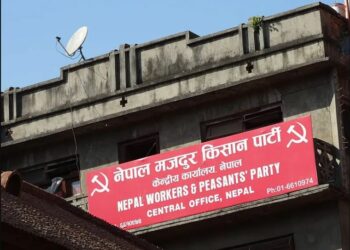KATHMANDU: The lockdown enforced since March 24 has brought abrupt closure of the industries, transportation, and all construction works.
This shut down in all sectors has spared more than Rs 28 billion that would have been used in the import of petroleum products otherwise.
The restrictions on the movement of the vehicles and the shutting down of large construction projects especially related to hydropower, drinking water, and road construction, and maintenance have led to the decline of the use of petroleum products.
However, the import of the goods and products of daily use is regular.
The country had imported petroleum oil and gold worth 146.66 billion rupees in the first 9 months of the last financial year.
Similarly, according to the Department of Customs, the country has spent Rs 118.80 billion to import petroleum oil and gold in the current fiscal year.
When the economy is nearly collapsed due to lockdown, over Rs 27.85 billion which would, otherwise, have been spent to buy petroleum products and gold.
Provided the saved budget is not best utilized, the economy will be further paralyzed: Economist
Economist Prof. Dr. Bishwambhar Pyakuryal says that though apparently the lockdown has saved money otherwise to be used in the import of petroleum products and gold, provided such saving is not used wisely, that may further worsen the economy.
The cause of the decline in the import of petroleum products is the restriction on the movement of private and public vehicles.
The proper channeling of the goods and supplies in the market strengthens the economy. Proper channeling helps the farmers get market for the products, ensures the supply of seeds and fertilizers needed for farming.
“Although the government seems to have done everything in principles, it has failed to execute them ‘on the spot’,” Prof. Pyakuryal says, “The agricultural products should get easy access in the market.”
He says that the abrupt shutting down of various sectors of the economy has caused a decline in demand and has also resulted in the decline of imports. However, the provided the proper mobilization of the capital does not get priority, the economy suffers in the long run.
Export and import are adversely impacted. The government has permitted the opening of small, medium and large scale industries of the country, however, there is no arrangement for the import or transportation of most essential goods required for them.
Prof Dr. Pyakuryal opines that the ‘cashing’ of the opportunity cost to import the goods and supplies needed for manufacturing industries and also to transport the products to the areas with high demands of them would be the best utilization of such saving.
Statistics speak
According to the statistics at the Department of Customs, there had been the import of petrol worth Rs 25.75 billion in the first nine months of the last financial year.
Similarly, the country had imported the air-fuel worth 10.38 billion whereas there had been an import of 84.52 billion worth diesel and 26 billion rupees worth gold.
This year the country has imported petrol, air-fuel and diesel worth 25.44 billion, 8.59 billion and 71.13 billion rupees respectively in the 9 months of the last financial year. The statistics show the import of 13.63 billion rupees in last year’s nine months.
In comparison to last year’s nine months, the country has imported fewer petroleum products: over Rs 320 million less petrol, over 2.39 billion rupees less air-fuel and over 13.38 billion rupees less diesel.
Similarly, this year there has been 13.06 billion rupees less import of gold in the first 9 months of the current fiscal year.
The price hike of gold had brought the import of it to a standstill between mid-August to mid-October.









Comment